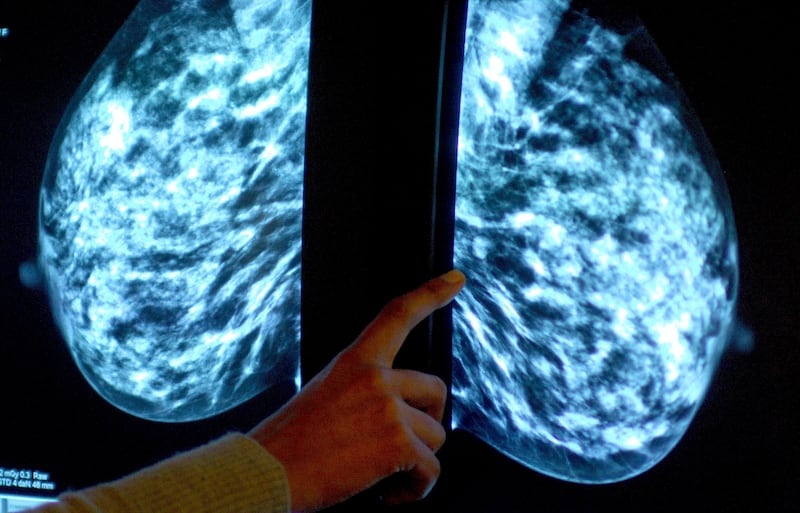Cancer research around the world is accelerating at pace, with the University of Cambridge's latest breakthrough in breast cancer prevention coming hot on the heels of similar developments elsewhere.
The research found that early intervention with immunotherapy drugs in healthy women carrying potentially cancer-causing genes could prove an effective preventive measure against breast cancer.
The breakthrough follows the University of Pennsylvania's development of treatment that makes immune cells track and destroy cancer cells in leukaemia patients.
It was recently revealed two of the first patients treated with the CAR-T cell therapy were still in remission, 12 years on.
Elsewhere at the University of California's San Diego School of Medicine, a recent study found success in identifying 95 per cent of early pancreatic cancers.
As one of the deadliest forms of the disease, pancreatic cancer is rarely diagnosed before it spreads, with a five year survival rate of less than 5 per cent.
The university looked at how biomarkers in particles that communicate between cells could be used to detect pancreatic, ovarian and bladder cancer at stages I and II.
The advancement promises hope of an earlier diagnosis, and treatment for better long-term survival rates.
'An exciting discovery'
The breakthrough has been heralded by a leading UAE-based expert.
"This is an incredibly exciting discovery that will provide more opportunities for our patients carrying the BRCA1 and BRCA2," said Professor Humaid Al Shamsi, director of oncology services , Burjeel Holding UAE.
"It is estimated that approximately 12 per cent of all breast cancer patients in the region are BRCA gene mutation carriers.
"Unfortunately, this week I had to cancel appointments with two BRCA-positive patients who were seeking preventive measures, specifically surgery to remove their breasts and ovaries."
He stressed that while some may perceive these surgeries as simple and easy decisions for women carrying these genes in order to save their lives, it was important to remember that they can have significant psychological impacts.
Those impacts include potential loss of fertility and the ability to have children in the future.
"This discovery holds the potential to open numerous doors for preventive immunotherapies," said Prof Al Shamsi.
"These immunotherapies could provide alternative options to surgery, allowing affected women to maintain a normal life without the need for invasive procedures.
"This breakthrough offers hope for preserving the health of women affected by these gene mutations while also addressing the emotional and physical challenges associated with surgery."
Angeline Jolie 'effect'
At the University of Cambridge, scientists identified immune cells in healthy women who carried faulty BRCA genes, and the delivery of immunotherapy drugs to prevent the onset of breast cancer, as a less invasive option to pre-emptive surgery.
“Our results suggest that in carriers of BRCA mutations, the immune system is failing to kill off damaged breast cells – which, in turn, seem to be working to keep these immune cells at bay,” said Prof Walid Khaled in the University of Cambridge’s Department of Pharmacology and a senior author of the report.
“We’re very excited about this discovery, because it opens up potential for a preventative treatment other than surgery for carriers of BRCA breast cancer gene mutations.”
Cancer is the third-leading cause of death in the UAE, with breast cancer the most common and accounting for 32 per cent of all cancers in Emiratis and 41 per cent in other nationalities.
Women in the UAE develop breast cancer at least a decade earlier than western women, making mammography screening a government health priority.
Although all women carry a BRCA1 and BRCA2 gene, about one in 400 will carry a mutation that could lead to cancer in the breast or ovaries.
Hollywood actress Angeline Jolie brought global attention to the BRCA1 gene when she opted for preventive double mastectomies after discovering she carried the same faulty gene that led to her mother’s deadly breast cancer.

Jolie estimated the inherited gene gave her an 87 per cent chance of developing breast cancer and a 50 per cent chance of ovarian cancer in her lifetime.
Publicly speaking of her experience pushed more women to be tested for faulty genetic mutations and also choose prophylactic mastectomies to reduce their cancer risk.
In the US, the number of women diagnosed with early breast cancer who chose preventative surgery increased to about 30 per cent by 2011, from 5.4 per cent in 1998.
Now, scientists at the University of Cambridge said the recent breakthrough could offer an alternative to surgery in preventive care.
Breast tissues samples were taken from 55 healthy women across a wide demographic, with more than 800,000 cells catalogued.
A technique called "single cell RNA-sequencing" was used to understand the different types of breast cells and their states.
Risk factors
Several factors influence breast cancer risk, making it challenging to predict.
Experts believe breast cancer risk increases with age, but this is reduced by pregnancy in early adulthood.
The study aimed to understand more about how risk factors interact, by examining cells in different states.
“As we collect more of this type of information from samples around the world, we can learn more about how breast cancer develops and the impact of different risk factors – with the aim of improving treatment,” said Austin Reed, a doctoral student at the University of Cambridge and joint first author of the report.
According to the UAE National Cancer Registry, in Arab populations, the median age at breast cancer diagnosis is about 48 years, with two thirds of women younger than 50.
Screening every two years has shown the greatest mortality reduction benefit in those aged between 50 and 69.







